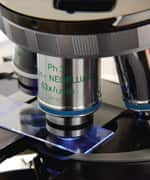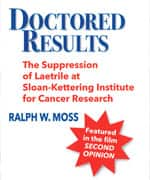Life Extension Magazine®

The Suppression Of Laetrile At Sloan-Kettering Institute For Cancer Research
“Lying to the American people wasn’t part of my job description.”
—Ralph W. Moss, PhD
Ralph W. Moss was the Assistant Director of Public Affairs at Memorial Sloan-Kettering Cancer Center in New York City. He started in the summer of 1974 and immediately became familiar with a substance that would become a turning point in his work with the organization.
As he states early in his book, Doctored Results, part of Moss’ job was to respond to letters written to Sloan-Kettering by the general public. He says there were often inquiries about specific therapies, suggestions concerning potential treatments, and as can be expected, some people writing with fringe ideas.
But to Moss’ surprise, numerous letters were written in regard to a substance called amygdalin, or, more popularly, laetrile. Laetrile was a cancer treatment that came from the kernel of an apricot pit, and many of the letter writers suggested this could be a potent weapon in the war against cancer. Like many Americans at the time, Moss was familiar with the substance because earlier that year, 60 Minutes host Mike Wallace had featured a story about Americans traveling to Mexico to access this unapproved cancer treatment.
It was a scenario far too many Life Extension® readers are familiar with: that of US citizens being forced to travel to foreign countries to receive treatments the FDA would not approve.
“As I read through the letters, I realized that some people were angry, very angry, that Sloan-Kettering wasn’t properly testing laetrile or refused to use this apricot pit ‘cure,’” Moss writes. “To answer them, Jerry [Moss’ boss] gave me a carefully worded statement that had been drawn up a year before. It said that the testing of laetrile at Sloan-Kettering Institute was ongoing but that, to date, it had been found to have no effectiveness in treating or preventing cancer. People should not abandon their proven, conventional treatments.”
Moss says that the general consensus around his office towards laetrile was one of “mild amusement or skeptical disbelief.” But that is not what a scientist working at Sloan-Kettering discovered. His research indicated that laetrile, while not a cure for cancer, was very powerful at preventing metastatic spread of the disease, at least in lab animals. The medical establishment, aware of this research, did everything imaginable to discredit it.
Once Moss lays the foundation of his own personal story in Doctored Results, he then goes on to give an interesting and fact-filled history of America’s war on cancer. In a particularly telling section, he explains the poor state of cancer research that existed in this country in the 1960s by comparing the cancer war to the space race.
“In the 1960s, America had spent $26 billion to land men on the Moon, and the only tangible reward had been a collection of rocks and dust of interest to a few astronomers,” he writes. “At that same time, all of the cancer scientists in the United States worked on a budget of $250 million a year—less than 1% percent of the Moon shot’s total.”
Having established his own experience and the state of cancer research in the United States at the time of his employment at Sloan-Kettering, Dr. Moss then begins to weave the tale of one of the biggest medical cover-ups the world of cancer research had ever seen. He introduces the major players with deftness and an objectivity often reserved for fiction, which is an impressive accomplishment in a book with this subject matter.
Moss goes through great pains to explain how each prominent doctor or scientist or politician or hospital board member came to play a role in the story of laetrile. One such person who stands out is Dr. Kanematsu Sugiura, who was deemed a “Living National Treasure” for his medical body of work. He was renowned for his legendary patience, which Moss says included running one experiment that called on him to inject mice with laetrile every day, seven days a week for two-and-a-half years. Dr. Sugiura never missed a single day.
As the story continues, Moss quotes Dr. Sugiura—a quote that resonates for the rest of the book.
Dr. Sugiura explained in an interview with Moss how his laetrile experiments were working at the time. In one example, he said that a breed of mice that gets cancer in 80 to 85% of studies was only showing a 20% cancer rate when treated with laetrile. Dr. Sugiura then pondered, “It would be interesting if it prevented it completely. One hundred percent prevention would be very interesting—then it would convince everybody…”
Moss then asked him why, with such success, were so many in the medical establishment against laetrile? To which Sugiura replied, “I don’t know. Maybe the medical profession doesn’t like it because they are making too much money.”

What followed is an out-and-out slandering of Sugiura’s research, as well as his character, by several high-level organizations. As the book progresses, Moss peels back layer after layer of the laetrile scandal until the reader can’t help but be disgusted by the events taking place. Like any good story, you don’t want to know the ending before reading the book, but suffice it to say that Life Extension® readers will appreciate the importance of this story, no matter how much we wish it weren’t true.
If you have any questions on the scientific content of this article, please call a Life Extension® Health Advisor at 1-866-864-3027.
To order a copy of Doctored Results: The Suppression of Laetrile at Sloan-Kettering Institute for Cancer Research, call 1-800-544-4440.
In addition to the book, Dr. Moss is also the subject of a documentary called Second Opinion, which tells this same story. For more information, please visit www.secondopinionfilm.com.

